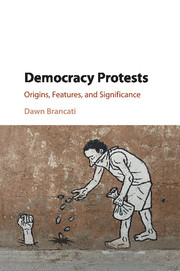Book contents
- Frontmatter
- Dedication
- Contents
- List of Figures
- List of Tables
- Acknowledgments
- 1 Introduction
- 2 Characteristics of Democracy Protests
- 3 Relating Economic Crises to Democracy
- 4 Analyzing the Rise of Democracy Protests
- 5 Analyzing Elections as Trigger Events
- 6 Historical Trends in Government Responses
- 7 Analyzing Political Accommodation
- 8 Historical Trends in Democratization
- 9 Analyzing Democratization
- 10 Conclusion
- Appendix: Data and Measures
- References
- Index
4 - Analyzing the Rise of Democracy Protests
Published online by Cambridge University Press: 05 September 2016
- Frontmatter
- Dedication
- Contents
- List of Figures
- List of Tables
- Acknowledgments
- 1 Introduction
- 2 Characteristics of Democracy Protests
- 3 Relating Economic Crises to Democracy
- 4 Analyzing the Rise of Democracy Protests
- 5 Analyzing Elections as Trigger Events
- 6 Historical Trends in Government Responses
- 7 Analyzing Political Accommodation
- 8 Historical Trends in Democratization
- 9 Analyzing Democratization
- 10 Conclusion
- Appendix: Data and Measures
- References
- Index
Summary
In this chapter, I analyze quantitatively the direct relationship between democracy protests and economic crises – measured in terms of three objective economic indicators and two subjective ones, setting aside an analysis of their indirect relationship for the next chapter. When economic crises arise, I expect democracy protests to be more likely to occur and for these protests to attract more participants, because crises raise discontent within society for governments in general and authoritarianism in particular, and because this discontent is likely to be greater the more severe the crises. In particular, I expect low growth, high inflation and high unemployment, as well as more negative evaluations of the overall economy and individual standards of living, to be associated with a higher likelihood of larger protests to occur. In contrast to modernization theories, I also expect economic development to be associated with a lower likelihood of democracy protests to occur because development generally mitigates the impact of crises on the public.
In brief, the statistical analysis, which includes 180 states between 1989 and 2011, indicates that economic crises are generally associated with a higher likelihood of democracy protests to occur, and that the worse economic conditions are in countries, the more participants democracy protests are likely to attract. Economic development, in contrast to modernization theories but consistent with my argument, is associated with a lower likelihood of democracy protests to occur, as well as a lower likelihood of economic crises to be associated with these protests. In further support of this finding, the analysis indicates that internet and telephone access, as well as education, are not significantly associated with an increased likelihood of democracy protests to occur. Detailed information about all the data and measures used in this analysis is available in the appendix.
OBJECTIVE INDICATORS
The objective measures – growth, inflation, and unemployment – are basic, but important indicators of macroeconomic performance, which are consistent over time and comparable across countries. The relationship between these indicators and democracy protests are analyzed continuously rather than in terms of particular “crisis” thresholds, given the lack of agreement among economists as to where these thresholds should be set, the danger of misclassifying borderline cases, and the desire to capture how the severity of crises affects the size of protests.
- Type
- Chapter
- Information
- Democracy ProtestsOrigins, Features, and Significance, pp. 61 - 83Publisher: Cambridge University PressPrint publication year: 2016



